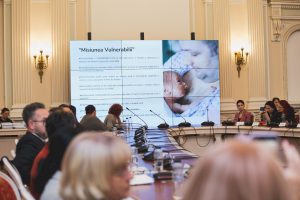Guest article by Diana Gamulescu, Co-founder and President of Asociatia Prematurilor in Romania.
Preterm birth as health challenge in Romania
In Romania, over 20,000 babies are born preterm each year, i.e. about 10% of all births. Experts recognise the major challenges preterm births pose for public health and the neonatal system in the country. Risks associated with being born too soon include an increased mortality rate and severe disability. In addition, many of these children experience neurodevelopmental difficulties, such as motor delays, cognitive deficits, reduced processing speed, behavioural problems, and integration difficulties.
According to recent studies and the experience of specialists and medical professionals, a large part of these serious health problems can be significantly reduced or completely eliminated when preterm babies are properly cared for following a multidisciplinary intervention and monitoring plan. Early intervention and integrated therapies can decisively change the journey of these children and make the difference between them becoming independent adults or persons requiring assistance their entire lives.
Taking parliamentary action

© Asociatia Prematurilor
On 7 November 2023, the Romanian Association of Premature Babies and the ABC Association of Education for Children, with the involvement of Nelu Tătaru, President of the Committee for Health and Family of the Chamber of Deputies, at the initiative of Deputy Mara-Daniela Calista, launched a proposal to implement the “Premature and Newborn at Risk” carnet as well as to establish Kangaroo Mother Care in all maternity wards.
The proposal was debated in the Romanian parliament. Speakers included Presidential Adviser on Health Diana Paun, senators and deputies, secretaries of state, representatives of the World Health Organization (WHO), members of the College of Physicians, doctors, specialists, and associations dedicated to supporting these vulnerable patients. Following the debate and presentation of the initiative, a law will be drafted that aims to formalise and implement this approach at national level.
The “Premature and Newborn at Risk” carnet

© Asociatia Prematurilor
The “Premature and Newborn at Risk” carnet is a tool for those working with preterm babies to track development and collect information. It is a concrete step towards ensuring appropriate measures of intervention and monitoring are taken and is designed to ensure correct and helpful information is collected. The proposed tool focuses on continuous and personalised monitoring of how the tiny patient develops, thus facilitating an efficient and coherent dialogue between families and the multidisciplinary team of specialists involved in their care.
By using this card, medical staff will be able to follow the child’s progress, recommend specific and appropriate therapeutic interventions. Possible complications can also be prevented more easily. In addition, families will have at their disposal an official information tool, endorsed by medical professionals and easy to follow.
At the parliamentary session, the representatives of the two initiating associations also presented a visual example for the “Premature and Newborn at Risk” carnet, inspired by the models of other states and conceived following technical discussions with doctors and specialists. Its final form will be debated more broadly in technical meetings with doctors and authorities.
An integrative approach to neonatal care

© Asociatia Prematurilor
During the parliamentary debate, the importance of an integrative approach to caring for preterm babies was repeatedly emphasised. This approach includes psychological support for families, information about the stages of development of the preterm child, and the involvement of parents in the therapeutic process. The central role of the physiotherapist was also addressed, highlighting the importance of early intervention, corroborated with other specific and alternative therapies.
This integrative approach to neonatal care also includes extensive Kangaroo Mother Care for all newborns, particularly preterm babies. Kangaroo Mother Care, among other benefits, helps stabilise body temperature, stimulates breastfeeding, strengthens the emotional bond between parent and baby, reduces stress and crying, stabilises vital functions, decreases the risk of infections, and supports the growth and development of preterm babies. The WHO representative attending the parliamentary session also detailed the advantages of initiating this therapy in maternity wards.
The road ahead
Session participants lauded both the “Premature and Newborn at Risk” carnet and the initiative to establish Kangaroo Mother Care as crucial steps to improve the care of preterm babies and newborns with pathologies. The coming weeks and months will see deepened discussions at the level of authorities and with the medical community. The approach launched and detailed during the debate will become the basis of a bill to support vulnerable preterm babies and newborns.
Read the original article in Romanian here.
More on Kangaroo Mother Care here.


